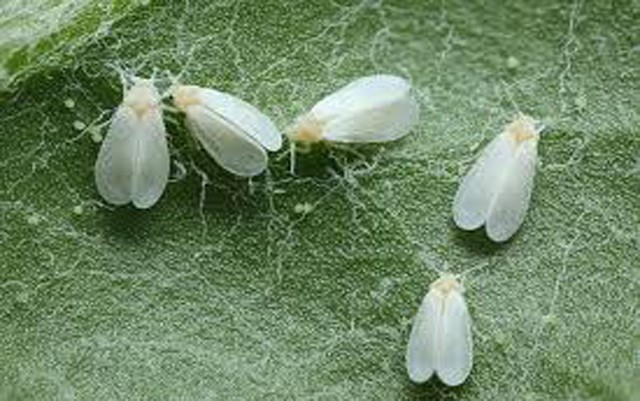
Whitefly, Stuck To A Golden Card, On A Summer’s Day, In Your Grow. . .
. . . Herbal Oils Must Fly or Buds Will Die.
(Sung to the tune of ” White Bird “ by It’s a Beautiful Day (1969))
Whiteflies are not really flies, they are more closely related to Aphids and Scale. In the nymph or crawler stage they look and act like Scale, as adults they are more like Aphids with wings. Like their cousins, Whiteflies make their living by tapping into and sucking plant juices out of the phloem and poop out a sugary excrement called honeydew. Honeydew often attracts the attention of Ants who will guard the producers of their “natures perfect food” against insect predators. Honeydew can also serve as fertile ground for Black Sooty Mold. (http://www.ipm.ucanr.edu/PMG/PESTNOTES/pn7401.html)
Vigilance is the best prevention against Whitefly infestation. Like so many other insect pests, Whiteflies congregate on the underside of leaves. On your daily inspections (you ARE monitoring daily, are you not?) you must randomly examine not just the visible canopy but the vulnerable undersides of leaves. If you are seeing a fairy dust poof of Whiteflies taking flight as you brush up against a plant, you’ve screwed up and let things get way out of control!
There are several types of Whitefly, each seeking out a slightly different array of natural host plant. In my garden the Sweet Potato Whitefly is occasionally found on our Roses. Cannabis is often the target of the Greenhouse Whitefly. Whenever possible carefully remove and dispose of infested material. Winged Aphid-like soft-bodied adults can be dislodged and killed with a directed jet of water, but the scale-like nymphs and eggs will hang on. If you must engage in chemical combat with Whitefly be aware that the usual less toxic methods such as insecticidal soaps and herbal oils are only effective if the pests are directly smothered in the spray, so generously drench and isolate any plants which must be treated.
Yellow Sticky Traps are an effective monitoring method and can be obtained in bulk for little expense. Hang these traps amongst your plants, near the canopy (not at ground level), and identify any bugs that get caught with your hand lens or microscope. Whiteflies are attracted to yellow and will get stuck to the traps, somewhat reducing the population by preventing a few of the adults from reproducing. Don’t count on the traps to completely manage an infestation; trap capture is best used as an indicator, not a preventative or solution.
I’ve said this before and it is worth re-stating: “Dense infestation can quickly weaken, wither and ruin any host plant. Indoors, exclusion is the best preventative. Quarantine new plants, disinfect tools, use HEPA filters on incoming air ducting; generally respect the cleanliness and integrity of your grow space like a medical clean room.”
Disclaimer: Any advice and opinions offered about the cultivation of cannabis by Bruce N. Goren are his own and do not represent the University of California or the Master Gardener Program.





